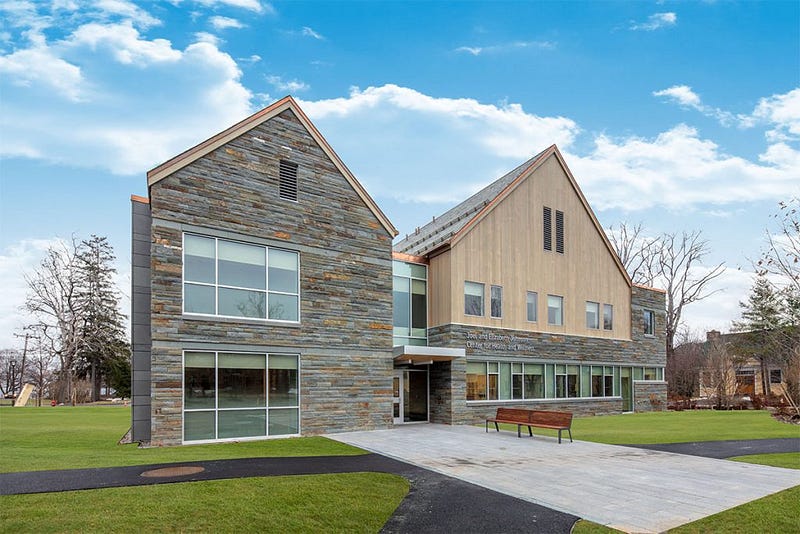
The Health Center now flaunts a new look. Photo courtesy of Chiang O’Brien Architects.
*Content Warning:* This article discusses mental health and physical health issues.
Editor’s Note: asterisks adjacent to names signify that a pseudonym has been used per the request of the interviewee, who asked for anonymity due to the sensitive nature of personal medical issues.
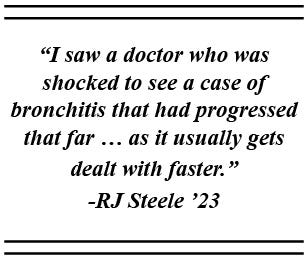
When RJ Steele ’23 contracted a cough in Fall 2021, he decided to call the Health Center. RJ had bronchitis before, so he knew the signs and wanted to come in for an appointment. However, his concerns were met with limited assistance. “I contacted the Health Center more than once, and each time was met with almost no help,” said Steele. “In the first call I told them what I thought it might be, and they recommended a humidifier and Mucinex.” Steele’s condition only got worse. “The cough became so bad it sometimes led to me vomiting and was forceful enough to cause a great deal of pain in my back and ribs that lasted for weeks.” The only solution he received from the Health Center was to “try breathing exercises,” said Steele. “Eventually, I returned to Canada and saw a doctor who was shocked to see a case of bronchitis that had progressed that far … as it usually gets dealt with faster.” Steele’s appointment at home lasted less than ten minutes, where he was given medication that cleared the bronchitis in a week.
The Johnson Center for Health and Wellness is nearing its fifth anniversary, yet within the state-of-the-art facilities, Hamilton students still often lack access to on-campus healthcare. Despite the building changes, students find that there is still not enough medical staff to attend to the student body.
In 2016, when the Health Center was still located in its old building, Director of the Health Center Barbara Fluty said, “this semester [Spring 2016] has been difficult to meet student demand as I am the only full-time provider in the Health Center.” Due to this lack of staffing, “some students had to be redirected to local urgent care facilities in order for them to be seen in a timely fashion,” stated Fluty in 2016. Fluty shared these thoughts with Kirsty Warren ’18 for her 2016
Spectator
article titled “Students share personal Health Center experiences.” In Warren’s interviews, many students expressed that they were “frustrated with the lack of availability of healthcare on the Hill.”
In Fall 2021, Fluty again found herself as the sole full-time provider in the Health Center, but this time during a pandemic.
Despite staffing issues, Fluty feels that the new facilities have helped: “In my opinion, this new space has opened opportunities, and it’s really given us the opportunity to think bigger…We’re trying to look for ways to expand services, and we’re exploring ways to expand availability for appointments. All things that I think students would benefit from and appreciate. I’m just really grateful for people’s grace while we get there.”
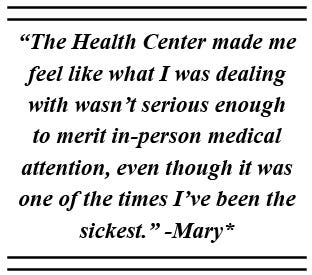
In Spring 2022, Mary* called the Center after throwing up 13 times in one day. “I was worried about how I was going to stay hydrated since I couldn’t even keep down water or Gatorade…I was also getting massive dehydration migraines. When I explained my situation and asked if I could come in, the woman was short with me on the phone and said the nurses determine who comes in so I’ll have to talk to them.”
Mary “got a call back probably three hours later,” recounting, “the advice I got over and over again was ‘make sure you’re staying hydrated’ even though I explicitly told them that I couldn’t keep water down.” She said that if her stomach bug had not gone away, “[she] would’ve had to go to urgent care or the ER because,” Mary recalled, “they provided negative help and basically made me feel like what I was dealing with wasn’t serious enough to merit in-person medical attention, even though it was one of the times I’ve been the sickest.”
For students to get seen by the Health Center, they must book an appointment first. “We go by appointment; the reason we do that is because otherwise we get really bottlenecked,” said Fluty. When scheduling an appointment, students are supposed to call the Health Center and explain why they want an appointment. “We ask students who are experiencing acute needs to speak to a nurse first so that they can get their story, understand what’s going on and try to assess what can wait and what needs more immediate attention,” noted Fluty.
Kate* told
The Spectator
that when she calls the Health Center, “they usually don’t pick up the phone. The most frustrating part is that when you leave a voicemail with your name and date of birth, they usually do not call you back…However, when they do, the cycle repeats because if you do not pick up the phone when they call, then you have to call back and no one picks up and you leave a message all over again.”
Fluty explains that if a student is in the early stages of being sick, they try to help them over the phone instead of telling them to come in. “If someone has had a very short time of symptoms, we’ll try to talk about some strategies to try [at home] first.” Over the phone consultations are also done because common flu, strep and COVID-19 symptoms all mirror each other. “Sometimes it’s hard getting them through the door because of some of the COVID-19 [regulations],” said Fluty.
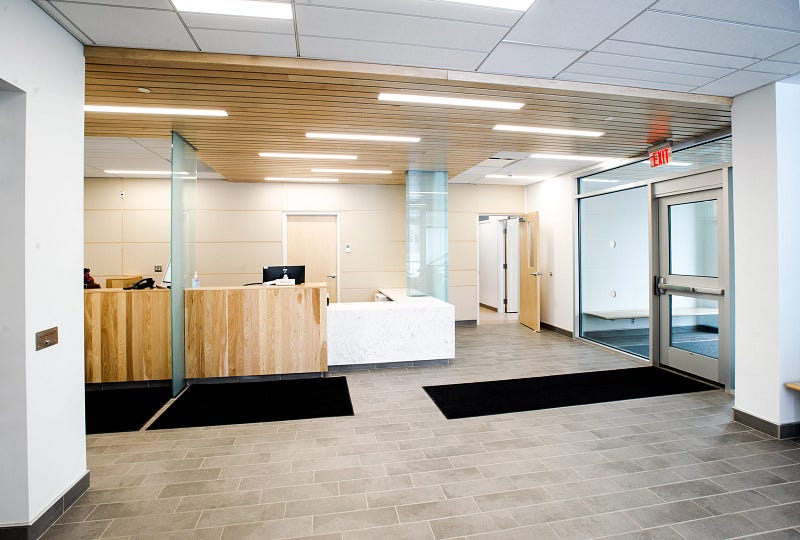
The Health Center boasts an open interior. Photo courtesy of Hamilton College.
The Health Center is not allowed to test for COVID-19 on site. Due to the Occupational Safety and Health Administration regulations, COVID-19 testing can only be administered at one site, explained Fluty. “In order to be compliant with [those regulations], we have to test in a satellite area, so that would be at [Tolles Pavilion], and then once we know they are good, we can bring them in.” Though over-the-phone treatment keeps appointments from piling up, it can limit the quality of care students receive.
Even in an emergency situation, students have found it difficult to schedule appointments. “I called them on a Thursday or Friday morning because I had a urinary tract infection and I was hoping they’d squeeze me in that day for more emergency circumstances” said Ashley*. “I explained how I’d been up all night with really bad pain and wanted an antibiotic prescription because they can get worse in the matter of days. They told me that they were all booked up and the earliest they could treat me was the next Wednesday since they only had one provider. They gave me no other advice except to go to urgent care, considering they probably knew that it had to be treated as soon as possible.”
The Health Center is open on Monday, Tuesday, Thursday and Friday from 8:30 a.m. to 12:00 p.m. and 1:00 p.m. to 4:00 p.m. It is open on Wednesdays from 10:00 a.m. to 4:30 p.m. It is not open on the weekends.
The Health Center will advise students to go to outside resources in order to “streamline their care” explained Fluty. “Sometimes we send people off because there’s actually a reason to send them off…like stitching right now.” To Fluty, sending students off campus is for their benefit, since “those things we do tend to send off just to try and expedite getting them seen and getting it solved more quickly.”
However, some students have recently been unhappy with the care they receive off campus. In 2021, Emily Rivito ’21 wrote a Longform Investigation article titled “The Absence of Trust: Students Allege Negative Experiences at St. Luke’s and St. Elizabeth’s” for
The Spectator.
She found that some Hamilton students actively avoid local hospitals because of their reputations. This article quoted a student expressing that she was “not willing to go to St. Elizabeth’s or St. Luke’s again…unless I’m in a life or death situation, I will never set foot in those places again.”
Ashley said that being sent off campus “led me to have a really not fun experience at an urgent care with a male doctor I didn’t feel comfortable treating me.” She continued, explaining that “the urgent care also ended up prescribing me antibiotics that my infection was resistant to which they didn’t realize until multiple days after…the Health Center not being able to give me 20 minutes of their time led me to getting improper care at my own expense.”
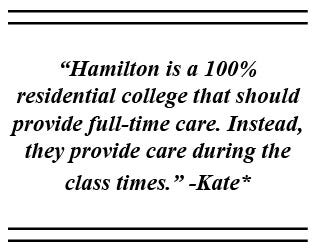
“I think it’s ridiculous that the Health Center isn’t open 24/7. Hamilton is a 100% residential college that should provide full-time care. Instead, they provide care during the class times,” said Kate. She noted that when attempting to receive care, “it’s difficult to make an appointment with them because they are usually full.” Right before Thanksgiving Break in Fall 2021, Kate tried to get an appointment at the Health Center. Instead of waiting for an open appointment, she decided to schedule one at the Slocum Dickson Medical Center, PLLC, an urgent care located in New Hartford, New York. She called them at 2:00 p.m. and had an appointment by 3:30 pm the same day. The Slocum Dickson doctor diagnosed her with bronchitis at that appointment. “I usually go off campus for help now because it’s faster,” said Kate.
To supplement care outside of its hours, the Health Center partnered with Fonemed. Fonemed is a nurse triage line consisting of healthcare professionals who are not local, but have been given information by Hamilton on the local medical services. According to the Health Center’s website, through Fonemed, “urgent calls will be answered immediately, but for most individuals, a message will be taken and a RN will call back, typically within 30 minutes.” Fonemed advises students with at-home treatment and, when necessary, directs them toward the nearest emergency rooms and urgent cares.
The morning after a student calls Fonemed, Fluty and her team meet and go over the calls. “The triage nurse at the time will be reaching out to those students and making sure that they’re doing okay. We see if they need to follow up, offer follow-up appointments, that type of thing.” Fluty views Fonemed as a vital supplement to Hamilton’s services, as and figure out what the best route to take is.”
For Elizabeth*, the lack of providers at the Health Center made her unable to receive any care whatsoever. “Before school started, I was in a hospitalization program for an eating disorder. In order for me to come back to school, my doctors gave me very specific guidelines outlining exactly what I needed to do to be successful at school,” said Elizabeth. One of the guidelines was for Elizabeth to get her vitals checked weekly by the Health Center. “My parents reached out to them in the beginning of the summer, and they responded that they weren’t sure what services they were offering [for the 2020–21 academic year] yet. When school started, we called again and got the same response.”
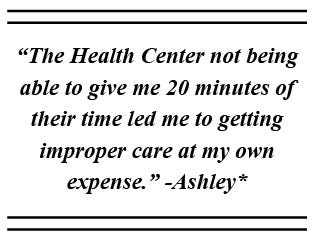
In November 2021, Chiming Tse P ’22, created a Change.org petition to make “the school become fully aware of how the majority of students and parents view the need to improve the health care services.” On Dec. 10, Interim Dean of Students Nancy Thompson wrote a letter to parents and students regarding recent complaints about the lack of quality and care students receive from the Johnson Center for Health and Wellness. Without directly addressing the petition, the letter noted that Hamilton was “here to listen” regarding questions, concerns and ideas.
Tse became concerned about the lack of services provided by the Health Center after his son, Ethan Tse ’22, complained about the Health Center. “It started with my son having his own negative experience…he had a pain in his neck and he went to the Health Center and, without giving any type of formal diagnosis, [the Health Center] sent him straight to the emergency room, where he waited for four hours before he saw anybody, and you know, that experience itself was terrible.”
Afterwards, Mr. Tse went on the Hamilton Parent Facebook group, a private forum where parents of Hamilton students can post questions and concerns about the College. Tse turned to a thread on the page where several parents had shared their childrens’ experiences at the Health Center. The thread consists of 33 comments from parents. When going through the thread, Tse says that he was looking to see if anyone had a positive experience with the Health Center. However, Tse has “yet to hear somebody say ‘oh, you know, I went to the Health Center, they were so helpful.’ There wasn’t a single good experience.” The parents’ overwhelmingly negative opinion of the Health Center inspired him to create the petition. “I think there’s some very realistic and doable solutions that wouldn’t take a lot for the school to do,” said Tse.
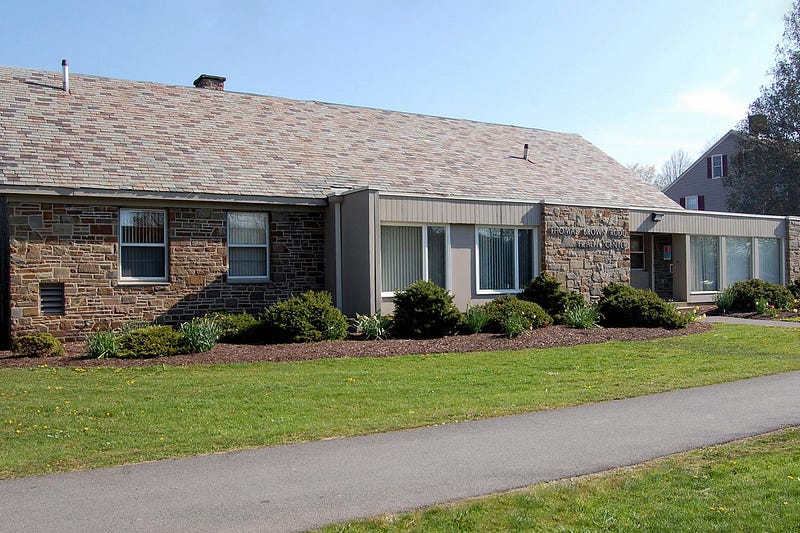
The Rudd Health Center was replaced in 2018. Photo courtesy of Hamilton College.
The Health Center moved to its new location at the Johnson Center for Health and Wellness in 2018, which replaced the former Rudd Health Center. Dr. Beth Johnson P’93 and Joel W. Johnson ’65, P’93 funded this center. Duncan Freeman ’22 interviewed the Johnsons right before the center’s opening for a 2018
Spectator
article titled “Near-complete Center for Health and Wellness dedicated over Family Weekend.” When Freeman interviewed the two, they said they viewed healthcare as a “glaring area where we could improve” calling it “a very clear need on all college campuses” and viewing the new health center as a “great opportunity to step forward.”
However, despite the new venue, these same sentiments of frustration and anger seen in 2016 persist. When talking to alumni, Tse said “the most disconcerting thing is that this is not a new problem, you’ve got kids that graduated four or five, six or seven years ago, and they were saying the same thing.” To Tse, the Health Center is “obviously not a high priority” to the College. “You can’t just be an aspirin dispensary and say ‘that’s it’ for right now…you have to be able to do a little bit more…I think hours are a critical piece, why can’t they be open six days a week for, say, eight hours? I mean it’s Hamilton, they can’t afford that?” remarked Tse.
As of Spring 2022, there are two practitioners and five nurses, with one nurse working full time at the testing center. There is a doctor who comes in for three hours on Thursday afternoons. However, Fluty agrees that the Health Center is still understaffed. “I’ve heard students’ concerns about availability and I’ve really been trying to be proactive and work on that, which is why we’ve been trying so hard to get staff,” said Fluty.
Fluty remarked that this lack of staffing is not just a problem facing Hamilton. “It’s been very difficult to find people and it hasn’t only been us. It’s been just Upstate [New York] in general.” Dean Thompson reiterated that statement in her letter, writing that “Hamilton, like many health facilities nation-wide, has faced a shortage of care providers.”
Hamilton’s location also makes it difficult to fill positions. Counseling Center Director, Staff Psychologist and Lecturer in Psychology David Walden, PhD mentioned that some doctors “wouldn’t necessarily want to live in Clinton” given its rurality and remoteness versus more urban places like Syracuse and New York City.
Fluty also mentioned that the salary can also deter possible candidates. “I love college medicine, but it’s not always the same pay rate as medicine outside of that.” COVID-19 has only exacerbated this problem. “It’s been very difficult to get healthcare workers, I think some are burnt out from COVID-19.”
When reflecting on student’s complaints, Fluty stated, “I want people to have good outcomes. I want them to have good encounters. I want them to feel supported. I feel terrible when people think that we’re not trying. That really breaks my heart because I really want people to know that I care about students. I wouldn’t have taken this job if I didn’t. I find the students on this campus to be really exciting, amazing interesting people and I want to help them.”
Recently, the Health Center has filled two positions: a nurse practitioner starting this summer and a physician assistant starting this fall. “‘I’m hoping that the next academic year will have more availability in place,” said Fluty. “I’m looking to make that happen. I know that hours and things of that nature have been difficult. I just hope that people would understand that it’s not personal, I’m one person, and so it’s been difficult trying to manage that.”
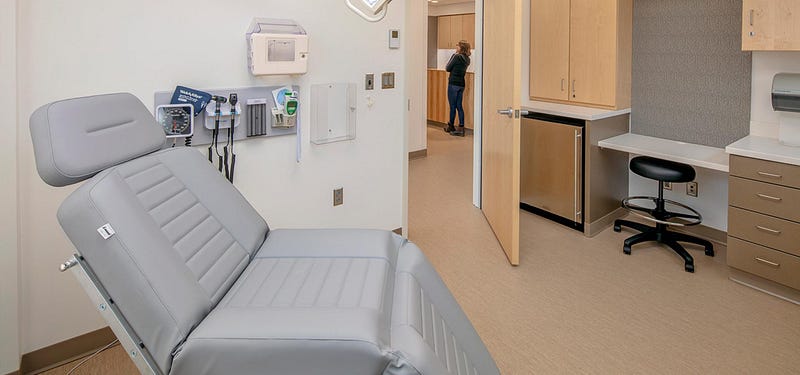
Students have struggled to earn a spot within an appointment room at the Health Center. Photo courtesy of Hamilton College.